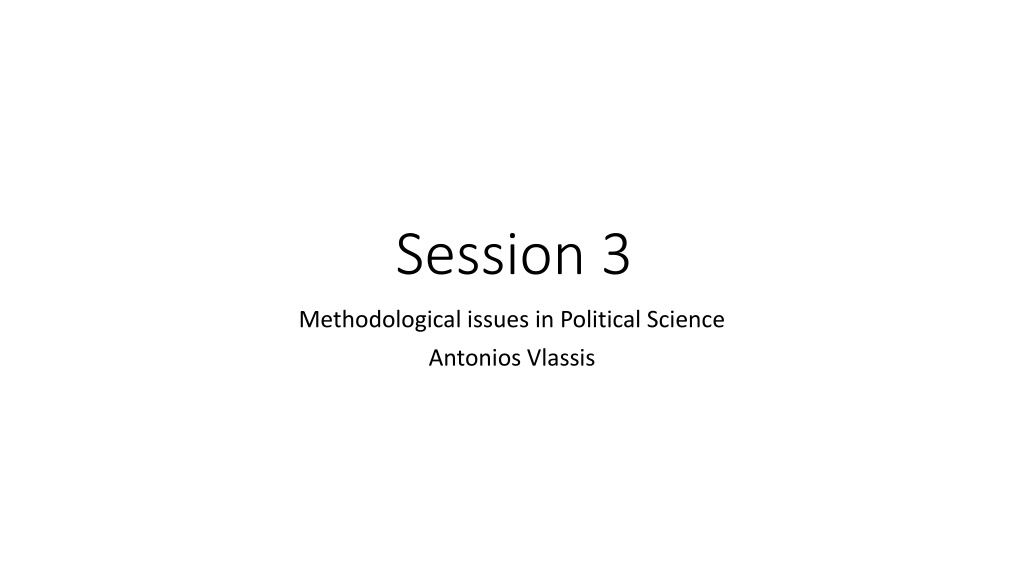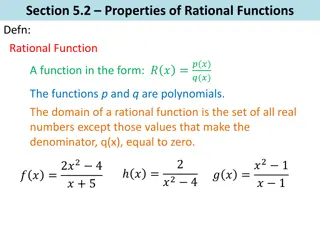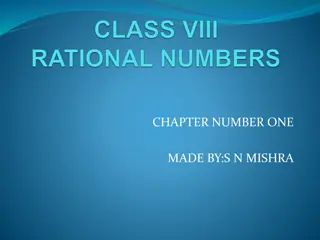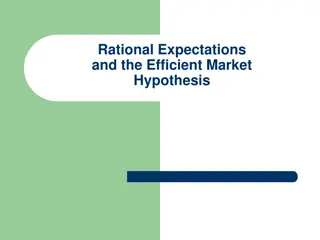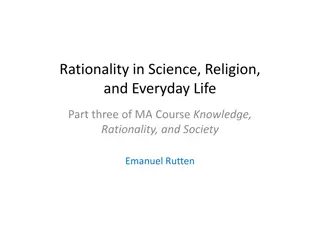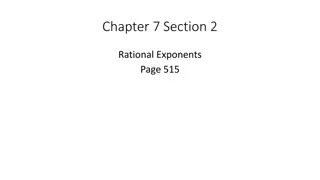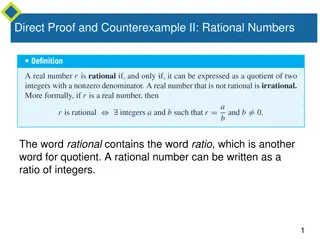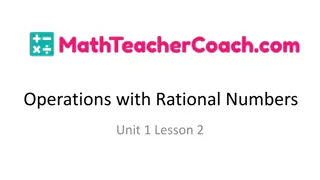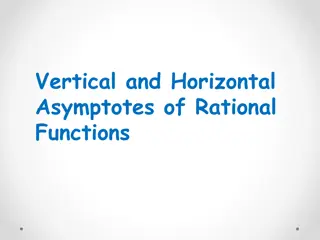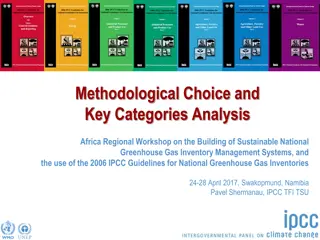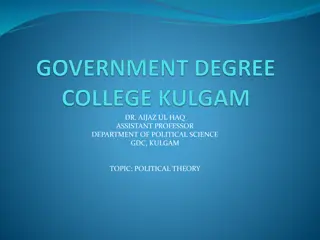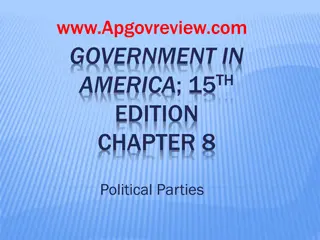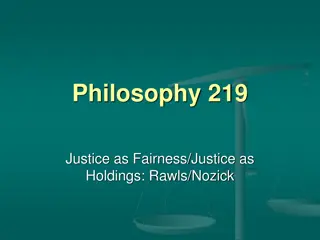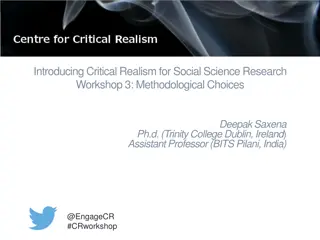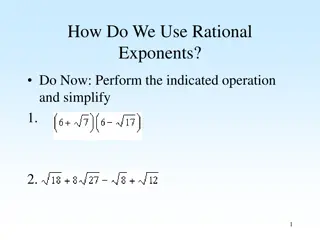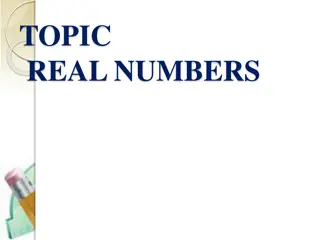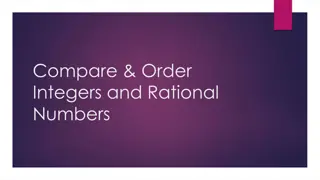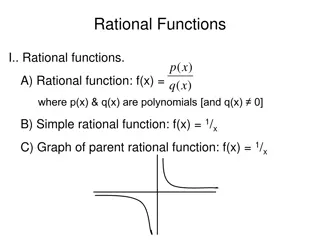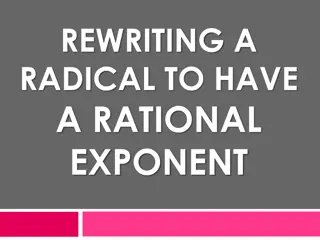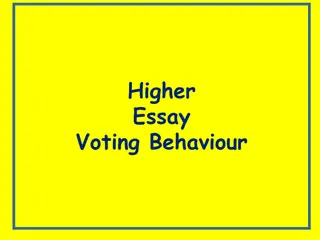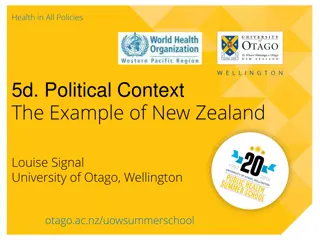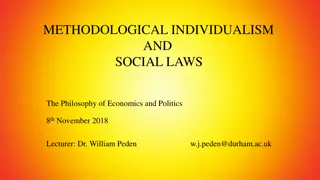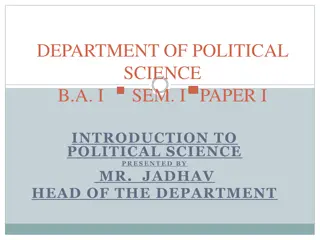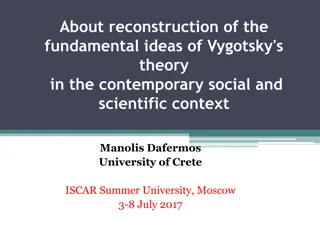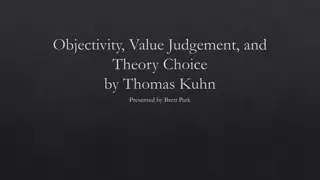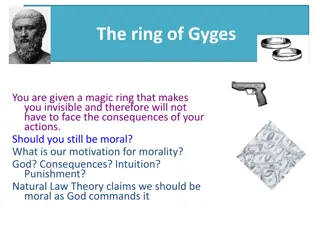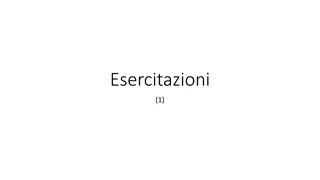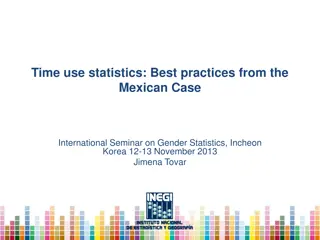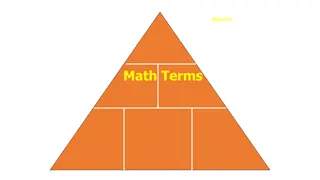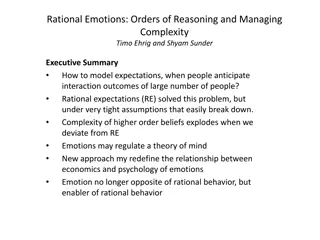Rational Choice Theory in Political Science: Methodological Insights
Rational choice theory, a prominent approach in political science since the 1970s, focuses on strategic interactions among individuals seeking to maximize their own goals. Rooted in economic tools, this theory emphasizes rational decision-making based on individual interests and preferences. Methodological individualism underpins the analysis, aiming to explain social phenomena through the behaviors of individual actors.
- Rational choice theory
- Political science
- Methodological insights
- Individual interests
- Strategic interactions
Download Presentation

Please find below an Image/Link to download the presentation.
The content on the website is provided AS IS for your information and personal use only. It may not be sold, licensed, or shared on other websites without obtaining consent from the author. Download presentation by click this link. If you encounter any issues during the download, it is possible that the publisher has removed the file from their server.
E N D
Presentation Transcript
Session 3 Methodological issues in Political Science Antonios Vlassis
Rational choice theory Since the 1970s, rational choice theory has emerged as one of the most active, influential and ambitious approaches in the discipline of political science. Like behaviouralism, rational choice approaches are focused on people, but instead of examining actions, they try to explain calculations behind those actions. They argue that politics consists of strategic interaction between individuals, with all players seeking to maximise the achievement of their own particular goals. The use of economic tools to deal with traditional problems of political science.
Rational choice theory The essence of rational choice theory is that when faced with several courses of action, people usually do what they believe is likely to have the best overall outcome (Jon Elster 1989). They argue that politics consists of strategic interaction between individuals, with all players seeking to maximise the achievement of their own particular goals, taking into account the constraints of the environment and the resources available, politics as an exchange process. The central tenet here is that interests matter. The assumption is that people are rational in the sense that given goals and alternative strategies from which to choose, they will select the alternatives that maximize their chances of achieving their goals. Rational choice arose as part of the behavioural revolution in American political science of the 1950 and the 1960s that aimed actually, to examine how individuals behaved using empirical methods. Where behaviouralists aim to explain political action through observation, surveys and statistical generalization, the rational choice approach focuses on the interests and strategies of the actors. Rational choice drawn on the methodology of economics.
Rational choice theory The rational choice approach variously called formal theory, positive theory, public choice theory or collective choice theory is an entry into political science from economics. The purpose of rational choice theory is to produce a deductive and predictive science of the political, modelled on the same assumptions that have proved so influential in neo-classical economics. This approach promises to establish a unified, cumulative political science theory part of unified formal social science theory based on common assumptions derived essentially from economics. The majority of theoretical perspectives in International Relations, Public Policy and in European Studies are based on the key assumptions coming from RCT. Rational choice theory emerges from classical microeconomics. As a method of political analysis, rational choice is based on three main assumptions: First: politics as a complex exchange process, as a strategic interaction between different actors The second is methodological individualism The third is the concept of rationality itself.
Rational choice theory Methodological individualism insists that everything about society and social action can be reduced to statement about component individuals. As a result the way to study politics is to analyse the political behaviour of individuals or collective actors. The explanation of social phenomena should build upwards from individual interests, strategies and preferences. That is rational choice is claimed to be reductionist aiming to explain things in terms of the properties of individuals.
Rational choice theory The assumption about rationality is essentially an assumption about human nature, more specifically, it is an assumption about what motivates individual. The analyst is able to predict particular actions and consequences as a result of an assumption about the motivational force of human nature. For instance Anthony Dows claims that we assume that party members act in order to attain income, prestige, and power which comes from being in office. James M. Buchanan and Gordon Tullock (1962)- . . . the basis for the theory of collective choice . . . assumes that the individual, as he participates in collective decisions, is guided by the desire to maximize his own utility and that different individuals have different utility functions. . . . We propose to analyze the results of various choice-making rules on the basis of this behavioural assumption, and we do so independently of the moral censure that might or might not be placed on such individual self-seeking action.
Rational choice theory Human beings are rational, material self-interest maximizers The picture of human being is one of egoistic individuals seeking to maximise their own good or well-being. From this simple assumption, we could develop hypotheses regarding any sphere of political activity how political parties should negotiate, about voting etc.; how states behave in the international arena, etc. RCT is a parsimonious theory. Rational choice theory is in essence, what you get if you seek to model political behaviour on the simplifying assumption that political actors are instrumental, self-serving utility maximisers. The political behaviour is self-interest, utility maximizing, goal directed, purposive. Actors behave rationally, maximising personal utility net of cost. Interests are the basic units of analysis. They have a clear and transitive hierarchy of preferences such that in any given context there is only one optimal course of action available to them.
Rational choice theory Rational choice explains collective outcomes through individual action It explains the outcomes that individual actions lead to in terms of the strategies open to them, their preferences over the-end and their beliefs about important parameters such as other s preferences It is by definition a simplified representation of reality constructed with a view to improve our understanding. Rational choice theory takes individuals preferences, available resources and feasible strategies as causes of the actions they take. Key concern: the aggregation of individually rational behaviour frequently produces collectively irrational outcomes. Rational choice theory opposes to normative democratic theory as well as to Marxist theories, which assume that a shared interest is sufficient for political mobilisation to take place.
Rational choice theory Rational choice: an approach to the study of politics based on the idea that political behaviour reflects the choices, made by individuals working to maximize their benefits and minimize their costs. The approach needs to identify the goals of the actors and how their objectives can best be advanced in a given situation. In the study of politics, the rational choice framework is often extended from the individual to the larger units. Rational choice models have made significant contributions to the study of politics and government. Rational choice theory has enabled scholars to construct explanatory models. Deductive logic of research (desk research and modelling). Rational choice theory modified the way that citizens view government, political process, democracy, role of public and private sectors about providing public goods, etc. Several criticisms (from democratic theory, new institutionalism, post-structuralism) Today: radical rational choice theory vs. moderate one. Dominant paradigm in US universities Europe: pluralistic picture
